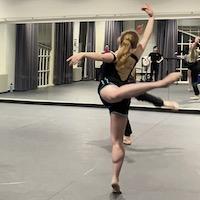 A new peer mentorship program,aims to improve accessibility to ballet at Harvard. (Also, Harvard Ballet Company's spring show is coming!)
A new peer mentorship program,aims to improve accessibility to ballet at Harvard. (Also, Harvard Ballet Company's spring show is coming!)
By Vicki Xu '23
OFA Staff Blogger
To Sedina Ackuayi ’25, the problem with Harvard dance is its fragmented nature.
While interviewing for various Harvard performance venues for the HBC semesterly show, last fall Ackuayi, who is DEI chair for the Harvard Ballet Company, realized that the extracurricular ballet scene needed to be more accessible and visible. Other dance groups, such as Harvard Expressions, had beginner dances for people new to hip-hop, but ballet had no analog.
To address both issues, she launched Beyond the Barre this spring. The program is a non-selective, no-audition peer mentorship program under HBC. Any member of the Boston community interested in ballet can match with company members. The goal is to provide a low-stress, low-barrier entry into ballet and to loop participants into the wider world of Harvard dance.
Find out more here about Harvard Ballet Company's spring show (March 30-April 1.)
The inaugural program consists of around 30 participants, around 15 mentees and 15 mentors. Perks include discounted Boston Ballet tickets, the opportunity to attend the dance mentor’s rehearsals, and attending monthly HBC-member-taught company classes at the Office for the Arts.
“It’s a way to get to do things,” Ackuayi says. “Because stakes are really low, people are willing to give it a try.”
Like many other dance groups on campus, HBC has an audition process. Auditionees attend a basic ballet class taught by a member of the company, consisting of routines to do at the barre and routines to do in the center. The directors of the ballet company watch and take notes. After the auditions, the directors compare notes and select a class.
Because company members don’t have to re-audition, net interest tends to exceed available positions. The company draws not only from Harvard undergraduates but also from the graduate school, Tufts, Northeastern, Boston University, and MIT. Consequently, most dancers in the company have had some formal ballet training; some have even performed pre-professionally or professionally. This diverse conglomeration offers great potential for community-building, but can also be daunting to those new to the space.
“I always encourage a lot of my friends to audition [to HBC], and I noticed that there was a kind of fear of approaching this space, where maybe you see dancers and you know their backgrounds and you might feel as though you’re not at that level,” says Ackuayi. “This is something that’s way more approachable.”
Beyond the Barre is also unique in that budding dancers can get mentorship from someone around their age, and it’s easily accessible. “Sometimes you want someone your age to share their wisdom and expertise … [and] the OFA classes are once a week, so you can’t really talk to the teachers regularly and say, ‘Hey how do I do this, how do I do that.’ To have someone you can text or send an email to is very convenient.”
Ackuayi plans to put on a social for participants at the end of the semester. Looking forward, she hopes to get a Beyond the Barre piece added to the HBC semesterly show—in which mentors and mentees dance together.
She looks forward to the program’s continued growth. “If all 58-plus members of Harvard Ballet could have a mentee, that would make me very happy,” Ackuayi says. “But I think 15 is a great start.”
Find out more here about Beyond the Barre and Harvard Ballet Company's show With Love, which runs March 30-April 1.